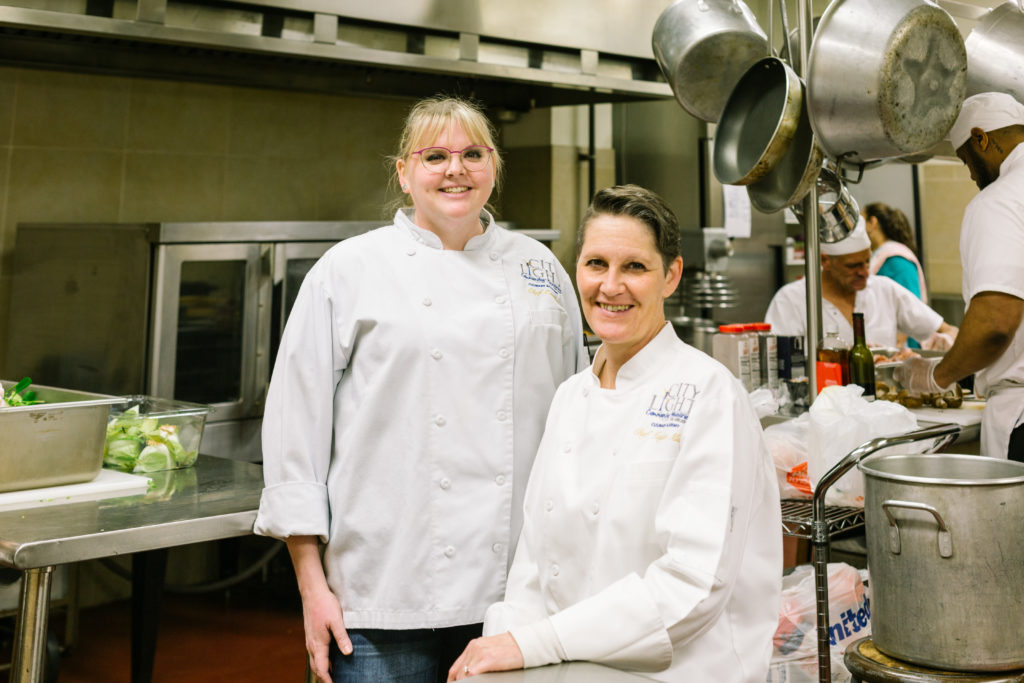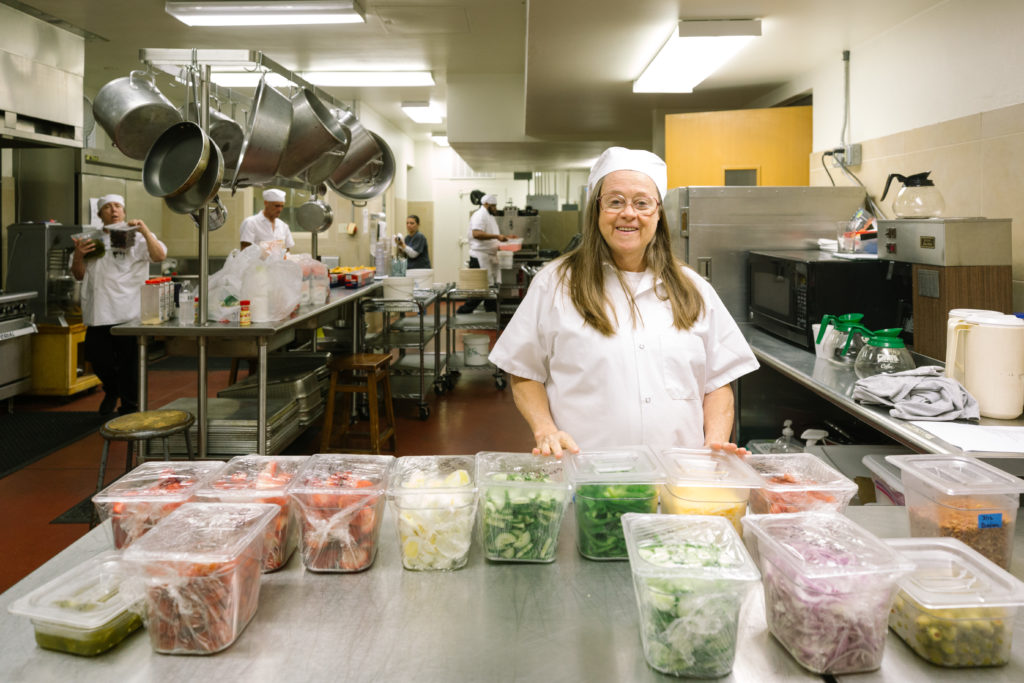City Light Academy offers food service skills and employment potential
All good cooks know that a great dish starts with ingredients that mix well together, and that same logic can be applied to a successful culinary arts school.
That recipe for success is what got First Baptist Church’s Culinary Academy off to a good start when the first students donned a chef ’s apron and hat in May 2019. The academy is operated through First Baptist’s City Light Community Ministries. The first ingredient was hiring the right person to lead the academy, someone with food service experience who could relate to the new program’s target population – people with employment barriers.
That box was checked with the hiring of Kayleen Mills, who not only had years of experience but who also had walked the road that many of her future students had walked. The next ingredients came when the students were signed up for the first class. The program is free to students selected, but just like ingredients in a recipe, they had to be a good fit. And that’s where Mills’ other skills came into play. She’s not only a top-notch chef and instructor, she also has a good feel for what people are going through and where they can be led.
One of the first students recruited for the May 2019 class was Chandra Underwood, who had been in Mills’ class when Mills taught at the former culinary school operated by Texas State Technical College in Abilene. That program has been phased out. Underwood, 22, remembers the call from Mills.
“Chef Kay called me and said she had this program,” Underwood said, “and she saw potential in me.”
Seeing potential in people is a key ingredient to the success of the Culinary Academy.
Underwood dropped out of high school and spent the next year and a half getting a General Educational Development or GED degree. She enrolled in the TSTC program but had a hard time – except for her class with Mills.
So when the call came from Mills, she was on board. Underwood was in the first class, which graduated in August 2019. Students who graduate get a food handler certificate and can then enroll in the online managers program if they wish. The food handler certificate got Underwood a job with Chartwells food service at Abilene Christian University. She has worked wherever Chartwells needs her, but her dream is to bake, a talent she discovered in her classes.
“I really liked baking bread,”Underwood said.“That was cool.”
The Culinary Academy operates out of the City Light Community Ministries building next to First Baptist Church on Hickory Street. Sometime in the future, it will move into a partially new and a partially renovated facility. In 2019, First Christian Church, a neighbor to First Baptist, moved and sold its property to First Baptist, which plans to renovate all the buildings for community services such as expanding its counseling center, relocating and expanding its child care center, and moving City Light Community Ministries into a renovated gym, with a new addition.
The architectural firm of Parkhill, Smith and Cooper has been hired to design the new facilities. The God’s Little Ones (GLO) day nursery and City Light Community Ministries will be the first relocated, said John Moore, pastor for missions at First Baptist.
“We are excited about what’s going on,” Moore said, although actual construction is still a ways off.
City Light Community Ministries historically has offered meals, shower and laundry facilities, Bible study, Sunday morning worship, and personal assistance. The addition of the Culinary Academy is a move in the direction the church, under the leadership of senior pastor Phil Christopher, wants to take with the purchase of the former First Christian property. Expanded social services will be an investment in people’s lives in addition to immediate assistance. A second step will be the addition of a case management program staffed by volunteers. That team will work with the Culinary Academy students and other clients of City Light Community Ministries to help them as they move forward.
“We’re really good at handling the crises,” Moore said, “but we want to take it a step further.”
The Culinary Academy, under Mills’ leadership, is constantly moving forward. The academy, with assistance from Catalyst Kitchens of Seattle, was designed around three 12-week sessions per year with no more than eight students enrolled in each course. Mills said eight is the maximum number that the current facilities will accommodate and that she can teach effectively.
“Even with eight, we’re on top of each other,” she said.
Although eight are signed up for each session,usually some don’t show up or drop out. The new facility will allow for more students. The students learn the basics of food handling in preparation for getting a job in the food service industry. But they get so much more than that. Catalyst Kitchens of Seattle is an initiative of FareStart, “an organization devoted to ending the cycle of joblessness, poverty, and hunger,” according to its website.
Representatives from Catalyst Kitchens have been to Abilene three times to help get the program off the ground. So far, they have been able to answer every question posed by Mills and others involved with the Culinary Academy.
“It’s like they know everything we’re going through,”Mills said.
Mills is considering expanding the Culinary Academy to 13 weeks so she can do more mentoring.The current 12-week schedule doesn’t allow much time for anything but teaching the basics.
“I want to get more one-on-one time with them,” Mills said. A recent addition to the class is preparing the Wednesday night meal served in the dining room at First Baptist Church prior to Wednesday evening worship and activity offerings. Caitlin Wallace was hired to oversee that endeavor, which serves as a job-training program for the students. On average, enough food to serve 180 people must be prepared each week. The preparation begins as part of the class curriculum on Tuesday, with the serving and cleanup coming on Wednesday.
Preparing, serving and cleaning up for those meals has been a great experience for the students and for church members, said Moore, who oversees City Light Community Ministries. Meeting the students and tasting what they’ve learned in the kitchen provides a connection for church members.
“It’s been great for the church to see that in action,” Moore said.
The Culinary Academy is still in its infancy stage but is well on its way to becoming the ministry that church leaders and members want. It is advertised on a Facebook page and with notices at Abilene ISD locations, halfway houses, the West Texas Homeless Network, and at other agencies and ministries.
Students enrolling in the academy won’t find a stronger advocate than Kayleen Mills or “Chef Kay” as the students call her. She has been where they are and knows there is a way out. A 1993 graduate of Abilene High School, Millis had dreams of attending Baylor University and becoming a doctor. She had excelled in Advanced Placement classes that would be needed in medical school.
But she was unable to finance medical school and instead continued working at Long John Silver’s restaurant and later at the former Black-eyed Pea restaurant in Abilene. That’s where she discovered her love of cooking, which led to her getting a degree in 2006 from the former Le Cordon Bleu College of Culinary Arts in Chicago. When Mills’ sister was killed in a car wreck in Abilene in October 2007, she knew she needed to return home. By then she wasthemotherofthreeboys,thenaged14,10,and6.
Back in Abilene, Mills worked at several restaurants and then was hired to teach at TSTC’s culinary arts program in Abilene. It eventually was phased out and Mills saw an ad for program director at the new City Light Community Ministries Culinary Academy.
Mills knows from years of experience that working in food service can lead to a better life. She pulled herself out of poverty by starting to work at Long John Silver’s while in high school and continuing to learn and grow. Now, she gets the chance to help others do the same. It is that empathy and desire to help others that sets Mills apart as director of the Culinary Academy.
She not only possesses the skills necessary for success, she recognizes potential and reaches out. Underwood, one of the first students she recruited, is the perfect example. In the classes at TSTC, Mills noticed that Underwood had skills but lacked self-confidence.
“I saw that in her,” Mills said, “and I wanted to build that up in her and make her believe it.”
Underwood didn’t finish the course, and the TSTC program eventually was phased out. But she was the first person Mills thought of when she was hired to lead the new Culinary Academy.
“I knew there was something there,” Mills said. “All she needed was a lot of confidence.”
She found that confidence and honed her skills under Mills’ leadership while getting her food handlers certificate through the Culinary Academy. She is one of several success stories that Mills can count – with the count growing every day.
Mills is grateful for getting hired to lead the academy, a job that utilizes her professional skills and her gift for wanting to help people. Every day is filled with opportunities and challenges. Mills admits that a challenge she will be facing for a while longer is waiting on the new facilities to be constructed.
“I try really hard not to think about it,” she joked.




























Is this program still operating. I have a 19 year old grandson. Very intelligent, but also ADHD. He started cooking at 10 years old—I taught him because he was always wanting to eat. It wasn’t long before he could cook simple recipes without supervision, and then started revising them to suit his own tastes.
He is old enough to be on his own (graduated high school), but not ready to be on his own. I think your program would be awesome for him. He is a pleasant and happy young man, but the ADHD remains an issue, but he is maturing and learning to cope with it. He is dyslexic (common with ADHD), but it only shows in his handwriting, which is atrocious..
Thank you for responding. Barbara J Power Breckenridge, TX